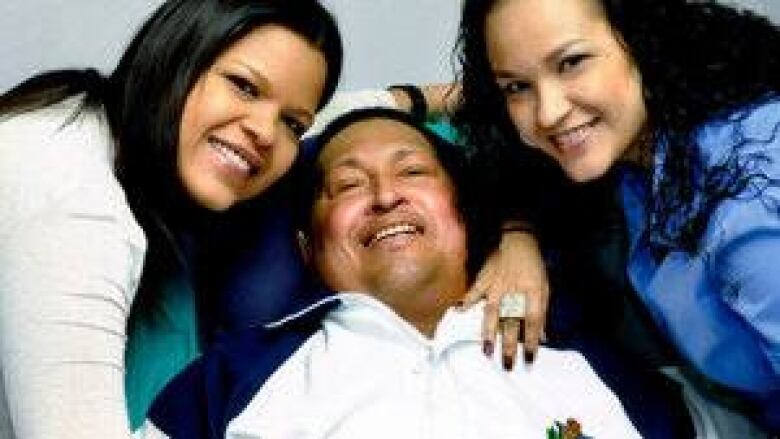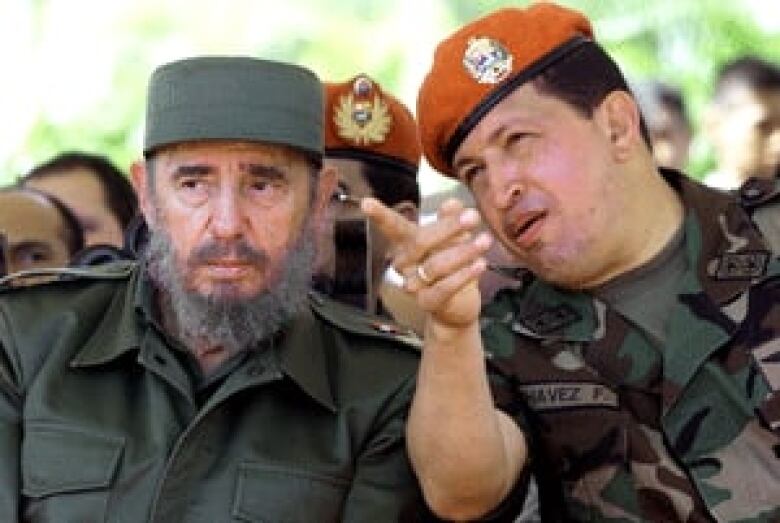Hugo Chavez: 1954-2013
From an impoverished childhood to the forefront of Latin American politics
Hugo Chavez, the popular but polarizing and provocative president of Venezuela, has died in office. He was 58.
Chavez gained international attention as the key leader of a new leftward direction for several Latin American governments and as a thorn in the side of the U.S. administration.
A baseball player, military officer, national heartthrob and reality TV star, Chavez went from an impoverished childhood to the forefront of Latin American politics.
His life had many key moments, but two pairs of events are critical. One was the coup he led that failed but set him on the road to success, and a coup against him that succeeded but then failed within 48 hours.
And there was the constitutional referendum he won in 1999 and the one he lost in 2007, the only vote Chavez ever lost.
Poor beginnings
Hugo Rafael Chavez Frias was born in 1954 in Sabaneta, a village in the grasslands of Venezuela's west.
When he was born, the second of six children, his father, with only a Grade 6 education, taught in Saboneta's only school.
The poor and rapidly growing family could not manage on a rural teacher's small salary, and so Hugo and his older brother went to live with their grandmother, Rosa Ines Chavez. She would be a huge influence in his life.
Chavez was a good student but also had the potential to play baseball in the major leagues. At the age of 17, that goal took him to the Venezuelan Military Academy, because of its baseball program. An injury ended his baseball dreams, but his trajectory into the military was set.
Chavez grew up in a Venezuela that was transitioning from a past of dictatorships to one in which the dominant political parties ruled the country under a formal power-sharing agreement regardless of how Venezuelans voted.
The country grew increasingly corrupt, while generating increasing oil revenue from its vast reserves. Despite the country's oil wealth, most Venezuelans struggled to get by.
Radical ideas
Chavez was first exposed to radical ideas during high school, after moving to the state capital with his grandmother and brother so the boys could attend a high school. Exactly when Hugo became a radical is now shrouded in myth and distortion.
Early in his military career, Chavez began to conspire with other officers, who held Simon Bolivar, the great liberator of half of Hispanic South America, as their hero.

Gabriel Garcia Marquez, the Nobel prize-winning Colombian novelist, in 1999 asked Chavez about their goals, two weeks after Chavez began his first presidential term.
"Very simply, [Chavez] said, 'With the end of preparing us if something should happen.'"
In 1989, when Caracas, the capital, was overwhelmed by a popular uprising known as the Caracazo, Chavez's group kept a low profile.
They began planning a coup.
Corruption and austerity measures were leading to increased dissatisfaction with the government. A newspaper poll in January 1992 found 81 per cent of respondents had no faith in the government.
The coup began on Feb. 4, but was overwhelmed by resistance from loyalist military forces. Chavez surrendered.
The government agreed to let Chavez go on national TV to call on his comrades still fighting in other parts of Venezuela to also surrender. It took only a minute, but it was quite a performance.
"Unfortunately, for now, the objectives we established in the capital were not achieved," Chavez said. He concluded by telling viewers, "I assume the responsibility."
Someone taking responsibility for something that had gone wrong in their country was a new experience for Venezuelans. Although in jail, Chavez was well on his way to folk hero status.
Growing popularity
The next year, President Carlos Andres Perez Rodrguez was impeached for embezzling state funds and the following year, in 1994, Chavez was released, in an attempt to slow his growing popularity.
After the failed coup, Chavez became something of a sex symbol in Venezuela. His marriage to his first wife, Nancy Colmenares, the mother of his first four children, ended. So did his nine-year affair with historian Herma Marksman, who had been the main information conduit between military bases for the coup plotters.
Chavez began to speak publicly about corruption, poverty and injustice. "The crisis is so deep, the gangrene is so profound, as Bolivar used to say, that it can't be cured by palliatives," he told a rally in 1994. "The only way is revolution."
In 1998, Chavez was elected president with 56 per cent of the vote.

During Chavez's first year in office, Venezuela benefited from skyrocketing oil prices. A constituent assembly rewrote the constitution in a radical new direction advocated by Chavez. It also centralized more power in the presidency and lengthened term limits. Once the draft was overwhelmingly approved in a referendum, Chavez's Bolivarian revolution was underway.
That revolution could be described as part socialism, part Latin American anti-imperialism and solidarity, and part Chavez's own personality.
In 1999, "Alo Presidente" (Hello, President) Chavez's reality show/talk show hybrid began airing on Sundays on Venezuelan TV. "Articulate, artless, more than a little hefty, completely at his ease, open-faced and just folksy," was how writer Alma Guillermoprieto described his TV presence.
Chavez easily won re-election in 2000, as he would do again in 2006 and 2012.
Coup victim
In 2002, Chavez's radicalism was encountering significant resistance. The Venezuelan elite and elements of the armed forces hastily mounted a coup. Chavez was seized and businessman Pedro Carmona was installed as the country's new leader.
Washington quickly expressed its support for the new regime.
When Carmona began announcing anti-democratic measures, a popular revolt against the coup quickly rose up, forcing Chavez's release and his return to power, his grip now more secure than ever.
In 2007, Chavez's wanted to extend the revolution, which required a major rewrite of the 1999 constitution. Chavez also wanted to remove the term limits for the presidency and other political offices.
In a referendum, Chavez's proposals were narrowly defeated. It was the only vote Chavez ever lost.
The loss slowed his march but some of the measures were implemented through parliament, and in 2009 he staged another referendum and achieved his goal of removing the law that limited how long he could remain in office.
Health concerns
But disease had another agenda. In 2011, Chavez revealed he had cancer.
Early in 2012, he declared he was cancer-free, but seven weeks after winning re-election, he announced the cancer had returned. He had his fourth cancer treatment in Havana in December.
On Feb. 18, Chavez flew back to Venezuela for the last time.
Chavez leaves a divided legacy: a reputation for autocratic rule, ineffective implementation of programs, censorship and human rights violations, high crime rates and charges that the Chavez family has become inexplicably wealthy.
But poverty lessened significantly during Chavez's time in office, and as Bloomberg Business News noted during the election campaign, "Venezuela has the lowest level of inequality in Latin America and the Caribbean, according to the United Nations."
And due at least in part to Chavez's efforts, Latin America has been moving left.
The key question now is whether he dominated his revolution too much for it to survive without him.












_(720p).jpg)


 OFFICIAL HD MUSIC VIDEO.jpg)
.jpg)



























































































